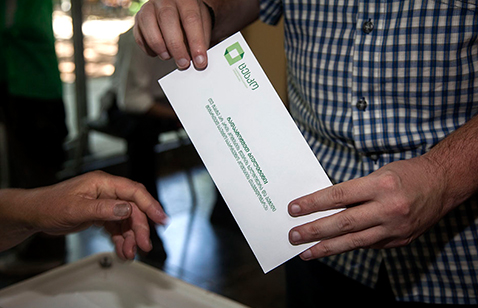ISFED: 2016 pre-election campaign better than 2012

Pre-election campaigning in Georgia is taking place in a "largely peaceful” environment, says one of the country’s leading non-governmental organisations.
International Society for Fair Elections and Democracy (ISFED) published its first interim report of its pre-election monitoring for the October 8, 2016 Parliamentary Elections yesterday.
The NGO’s executive director Mikheil Benidze said there were obvious better practices in this year’s campaign where fewer violations had been reported than during the 2012 pre-election period.
"If we compare [the 2016 and 2012 pre-election campaigns], the 2016 campaigning is obviously better,” Benidze said.
"However, the reported facts are still important and their number should be decreased, not increased, as the campaign continues.”
During the reporting period (July 1-18) ISFED identified:
- Two cases of intimidation/harassment based on political affiliation,
- Three cases of dismissal from work on alleged political grounds,
- Two instances of violence,
- Two cases of possible vote buying,
- Five cases of participation of unauthorised individuals in canvassing, and
- Two cases of use of administrative resources.
The NGO also mentioned ex-President and leader of the opposition United National Movement (UNM) party Mikheil Saakashvili, who is now Odessa regional Governor in Ukraine and has received Ukrainian citizenship, had violated Georgian law when he participated in UNM’s pre-election campaign.
ISFED said on July 11 and 14 when UNM introduced its majoritarian candidates in Marneuli, Akhalkalaki and Ninotsminda respectively, Saakashvili called on the public to vote for the UNM candidates in a video address from Ukraine. Under the Georgian Election Code, foreign citizens have no right to participate in a pre-election campaign and tell people who to vote for in Georgia.
The report also summarised changes in local budgets in some municipalities and stressed scaling up of social and infrastructural projects.
"Although the Election Code prohibits such changes within 60 days ahead of elections, activation of social campaigns and mobilisation of budget funds for social projects lead us to believe that initiation or expansion of social projects in some municipalities has to do with the formal launch of the pre-election campaign,” ISFED said, adding it had found eight such cases during the reporting period.
ISFED’s long-term observers attended 52 public meetings of electoral subjects that took place between July 1-18, 2016. The report outlined pre-election promises made by political parties during these public meetings.
The NGO planned to address local self-governments, electoral subjects and the Inter-Agency Task Force with recommendations about issues highlighted by the monitoring report.
ISFED carries out pre-election monitoring in all electoral districts of Georgia through 68 long-term observers.
 Tweet
Tweet  Share
Share